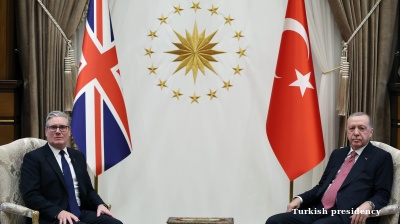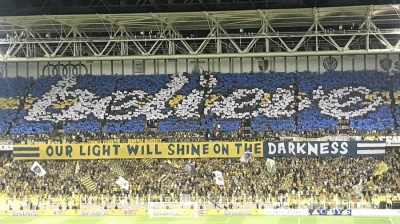Akbank (AKBNK) obtained a $650mn sustainability-linked syndicated loan in five tranches, the lender said on October 27.
(Story chart: Turkish corporates’ external debt rollover rates).
Two 367-day tranches are worth $152mn and €132mn, while the two-year and two-day tranches are worth $272mn and €15mn. The final three-year and two-day tranche stands at $54mn.
A total of 46 banks from 20 countries, including eight newcomers, placed more than $1bn worth of combined bids for the facility. The two-year and three-year tranches are sustainability-linked.
Costs
The cost of the 367-day USD-tranche stood at the guaranteed overnight financing rate (SOFR) plus 150bp while the cost of the 367-day EUR-tranche was the euro interbank offered rate (Euribor) plus 125bp.
The costs of the two-year tranches, meanwhile, stood at SOFR+1.90% and Euribor+1.65%. The cost of the three-year tranches were released as SOFR+2.15% and Euribor+1.90%.
The lender provided cost information for a three-year EUR tranche although it has not obtained a loan under this line. It seems that it priced this tranche but no bids were placed or accepted.
114% rollover rate
In October 2024, Akbank rolled its loan at a renewal rate of 124% and at costs of SOFR+1.75% and Euribor+1.50% for the 367-day tranches. The 734-day tranches, meanwhile, re-emerged while the costs were released at SOFR+2.25% and Euribor+2.00%.
The 367-day tranches were worth $273mn and €254mn. As a result, the renewal rate of the latest loan stood at 114%.
Spreads fall further
All spreads on the latest loan fell by 10bp compared to the spring season while the spreads on the USD tranches declined by 25bp compared to last year while the EUR spreads fell by 35bp. (See full list here).
The benefits of Turkey’s so-called economic normalisation policy applied since June 2023 have clearly been observed in the external debt rollovers. Across the period, the spreads on the 367-day tranches have fallen by 275bp while the two years and three years have re-emerged.
Ratings up
Akbank has another syndicated loan. In April, it rolled this loan at a renewal rate of 125%. The costs of the 367-day tranches were released at SOFR+1.60% and Euribor+1.35% while the two-year costs stood at SOFR+2.00% and Euribor+1.75%. The three year costs came at SOFR+2.25% and Euribor+2.00%.
In line with local peers, Akbank has a BB-/Stable rating from Fitch Ratings and a Ba3/Stable from Moody’s Investors Service.
Loans rolled twice a year
Turkish banks roll their syndicated loans twice a year, with one season in spring (April-July) and the other in the autumn (October-November).
Akbank launches both seasons by setting the Turkey benchmark for the interest rates. All leading banks release identical costs, while some of the lenders, particularly the smaller ones, pay higher fees.
In this autumn season, a total of 10 banks will roll over a combined sum of $6bn as longer-term tranches re-emerged last year and only 367-day tranches will be rolled over this year.
Setting benchmarks for Turkish borrowers
The share of syndicated loans in the external funding composition of Turkey and Turkey's banks has declined in recent years. Turkey rolls over a combined sum of around $200bn each year.
Despite the lower share in the composition, the banks’ syndicated loan renewals are a good indicator when tracking developments in the sustainability of Turkey’s external debt burden.
They share exact maturities and costs, setting benchmarks.
Data
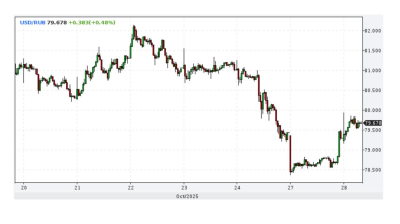
Ruble strengthens as sanctioned oil companies repatriate cash
The Russian ruble strengthened after the Trump administration imposed oil sanctions on Russia’s leading oil companies, extending a rally that began after the Biden administration imposed oil sanctions on Russia in January.

Russia's central bank cuts rates by 50bp to 16.5%
The Central Bank of Russia (CBR) cut rates by 50bp on October 24 to 16.5% in an effort to boost flagging growth despite fears of a revival of inflationary pressure due to an upcoming two percentage point hike in the planned VAT rates.
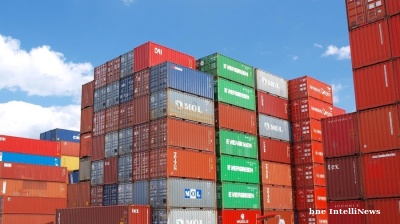
Ukraine's trade deficit doubles to $42bn putting new pressure on an already strained economy
Ukraine’s trade deficit has doubled to $42bn as exports fall and imports balloon. The balance of payments deficit is starting to turn into a serious problem that could undermine the country’s macroeconomic stability.
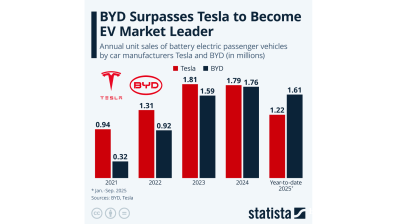
BYD surpasses Tesla to become EV market leader – Statista
While Chinese manufacturer BYD already pulled ahead of Tesla in production volume last year, with 1,777,965 battery electric vehicles (BEV) produced in 2024 (4,500 more than Tesla), the American manufacturer remained ahead in sales.


_Cropped_1761809941.jpg)
